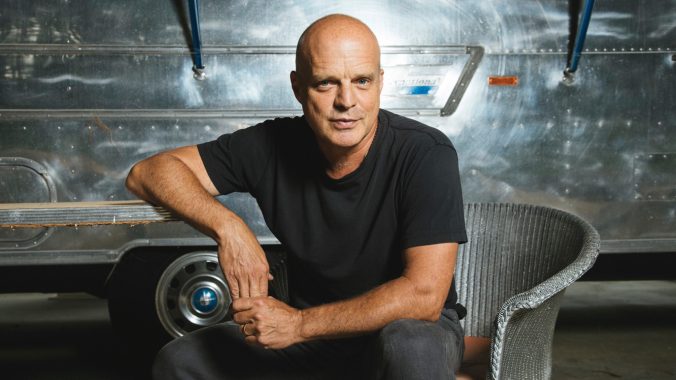Composer John Medeski Talks The Curse, Oneohtrix Point Never and Nathan Fielder
Photo by Michael Bloom
Every once in a while A24, the powerhouse indie studio behind films like Ari Aster’s Hereditary or the Daniels’ Everything Everywhere All at Once, blesses TV viewers with a show that ranges from glitter and drug-fueled extravaganzas (Euphoria) to slightly too addicting comedy dramas (Beef). Of course, for every dozen golden eggs, there’s got to be one we’d rather collectively forget about and move on (here’s looking at you, The Idol).
While it’s tempting to believe there’s some sort of Midas touch magic going on, it pretty much comes down to giving unconventional creatives a chance when all statistical odds are stacked against them. Finding someone equally mad and committed helps, too. How else do you think Donald Glover and Hiro Murai managed to convince studio heads to air Atlanta, one of the most original shows of the last decade (they “Trojan-horsed FX”, Glover told The New Yorker)? Or Eric Andre, “flat broke” and high on Space Ghost Coast to Coast gags, got the generation-defining comedy The Eric Andre Show off the ground (it was rejected pretty much by every reputable network, except for Adult Swim)?
Luckily, there wasn’t much convincing needed to be done for The Curse, Nathan Fielder’s and Benny Safdie’s creative endeavor, since both A24 and Showtime know exactly what these provocateurs are capable of. Playing philanthropic newlyweds who are trying to get their reality show about building eco-friendly housing off the ground, Fielder—the socially awkward punching bag Asher—and Emma Stone—the artist patron Whitney, who is trying to escape her parents’ controversial legacy—make quite a team. Add Safdie’s sleazy, semi-functioning alcoholic-cum-TV producer Dougie into the mix, along with a curse cast by a young Somali girl, and things really start to get weird. Slowly at first, like the creeping shots, which make you feel like a Peeping Tom, and then, as the show progresses, ramping it up until you find yourself in a hall of mirrors.
If it isn’t obvious already, there are many reasons that make The Curse a compelling watch. For starters, during hour-long episodes, barely anything happens. You might watch Dougie take a couple of shots of Fielder and Stone showing their energy-efficient home to potential buyers, or Stone trying to win over her Indigenous artist “friend” who was profiled by the New York Times by all means necessary. Then the credits roll and you’re left there scratching your head, unpacking just what makes the show so unsettling. At the same time, it’s equally addicting in the way that slow-burning shows like Better Call Saul or the bouncing DVD logo screensaver can be.
While the glacial pace of the show is the ultimate antithesis to Safdie’s anxiety-inducing oeuvre, the same, however, can’t be said about its soundtrack. Produced by Benny’s trusted musical muse Daniel Lopatin—the guy behind Oneohtrix Point Never, who scored both of their films, Good Time and Uncut Gems—John Medeski’s synthy score for The Curse is anything but mellow.
Like the show itself, Medeski’s melodies resist easy categorization, and trying to put a finger on them can often feel like reading Fielder’s self-deprecating characters. Part spiritual and part wavering—like the mirrored exterior of Asher and Whitney’s home—The Curse sounds like a synthesizer in need of some holy water. Just listen to “Asher’s Dilemma,” which ranges from piercing synths to tormented Gregorian chanting from pixelated Ninth Circle of Hell, or Tangerine Dream-ish “We Do This All the Time” and hear for yourself.
Naturally, Medeski, an established avant-garde jazz community figure and one-third of the Medeski Martin & Wood collective, was lost for words when tasked with describing what we’re hearing. “It’s really hard to put into words,” the 58-year-old keyboardist admitted, eventually calling it “a mood” (which it absolutely is). After all, he’s a musician. And why use words when you can say all that needs to be said with a cosmically funky chord progression? Luckily for us, the Curse composer managed to conjure up more words without the help of the trusty Moog synthesizer and tell Paste why Safdie and Lopatin’s pitch—involving no more than Alice Coltrane’s “Jagadishwar”—was a no-brainer, and what the enigmatic comedic genius Nathan Fielder is like behind the camera.
Paste Magazine: Coming off the show yourself, what do you think about it? Have you been watching it since it aired?
John Medeski: I’ve watched it, yes. I think it’s incredible. And I’ve gone to some of the screenings, too—they’ve been showing The Curse in movie theaters in New York as it’s coming out. I think the show is great. Like really great. I have actually seen a lot of it many times, and I haven’t gotten tired of it. Everything about it is hardcore all the way.
It’s pretty difficult to put a finger on The Curse emotionally and tonally speaking. How would you describe the sound of your score?
I haven’t really thought about that [laughs]. For me the music sort of describes itself. I use music as the language. It’s really hard to put into words. I guess, the music is definitely moody in a way. It’s not happy. But it’s not sad either. There’s also a slight spiritual feel to it. And that was actually the idea from the beginning. We got together with those guys [Benny and Nathan], and we did a recording session before they even started shooting. They had the script on, and they had certain ideas, but we got together because they wanted to try some things as they were cutting and shooting.
-

-

-

-

-

-

-

-

-

-

-

-

-

-

-

-

-

-

-

-

-

-

-

-

-

-

-

-

-

-

-

-

-

-

-

-

-

-

-

-








































